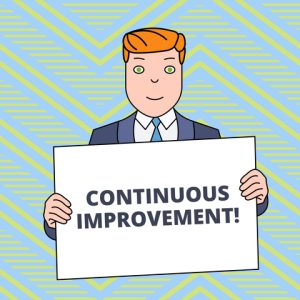by virtualworks | Feb 9, 2026 | Business, business growth, Customer relationships, KPI, Leadership, life work balance, Mastery, office management, Outsourcing, Productivity, Remote Office Management, ROWE, Team Work, working from home, working remotely
 In our ongoing exploration of the Results-Only Work Environment (ROWE), we’ve emphasized the importance of trust, autonomy, communication, and empowerment in creating a successful work culture. To ensure that ROWE remains effective and relevant over time, it’s crucial to engage in continuous improvement efforts. In this sixteenth installment, we’ll delve into monitoring and assessing ROWE effectiveness, implementing employee feedback mechanisms, and adjusting and refining your ROWE approach over time.
In our ongoing exploration of the Results-Only Work Environment (ROWE), we’ve emphasized the importance of trust, autonomy, communication, and empowerment in creating a successful work culture. To ensure that ROWE remains effective and relevant over time, it’s crucial to engage in continuous improvement efforts. In this sixteenth installment, we’ll delve into monitoring and assessing ROWE effectiveness, implementing employee feedback mechanisms, and adjusting and refining your ROWE approach over time.
Monitoring and Assessing ROWE Effectiveness
To maintain the success of a ROWE, organizations must regularly evaluate its impact on employees and overall performance. This can be achieved through a multi-faceted approach that incorporates both quantitative and qualitative measures. Consider the following strategies for monitoring and assessing ROWE effectiveness:
Key Performance Indicators (KPIs): Identify and track metrics that are directly related to ROWE success, such as employee satisfaction, productivity, retention rates, and goal achievement. Analyze these indicators over time to identify trends, measure progress, and determine the effectiveness of your ROWE implementation. Utilize data visualization tools or dashboards to make the information more accessible and actionable.
Employee surveys: Conduct anonymous surveys to gather feedback on employee experiences and perceptions related to ROWE. Regularly administer these surveys to track changes in employee satisfaction, engagement, and well-being over time. Pay close attention to both overall trends and specific areas of concern to inform your improvement efforts.
Performance reviews: Incorporate ROWE-specific elements into performance reviews to assess how well employees are adapting to the ROWE framework, managing their time, achieving goals, and contributing to the organization’s success. Use this feedback to guide individual and team-wide improvements in the ROWE approach.
Focus groups and interviews: Facilitate group discussions or one-on-one interviews with employees to gather in-depth insights on their experiences and perspectives related to ROWE. This qualitative data can complement survey findings and provide a more nuanced understanding of ROWE’s impact on the workforce.
Implementing Employee Feedback Mechanisms
Incorporating employee feedback is essential for refining and improving your ROWE approach. To create a feedback-rich culture, consider the following strategies for implementing feedback mechanisms:
Open-door policy: Encourage employees to share their experiences, concerns, and suggestions for improvement with managers or HR representatives. Foster an environment where employees feel comfortable providing honest feedback and ideas for enhancing the ROWE.
Anonymous feedback channels: Provide anonymous feedback channels, such as suggestion boxes or online forms, to encourage open and honest feedback from employees who may be hesitant to speak up otherwise. Regularly review and act on this feedback to demonstrate your commitment to continuous improvement.
Retrospectives and learning sessions: Conduct regular team meetings to reflect on past experiences, share lessons learned, and brainstorm potential improvements to the ROWE approach. These sessions can help teams learn from one another, identify areas for growth, and work together to refine ROWE strategies.
Employee feedback platforms: Utilize digital platforms or apps specifically designed for gathering employee feedback and facilitating discussions on work-related topics. These tools can streamline the feedback process and provide a centralized location for employees to share their thoughts and ideas.
Adjusting and Refining Your ROWE Approach Over Time
As your organization evolves and your workforce changes, your ROWE approach may need to be refined and adapted to meet the needs of your employees and your overall business goals. A dynamic approach to ROWE will help ensure its ongoing success and relevance. Consider the following strategies for adjusting your ROWE approach over time:
Continuous learning: Keep up-to-date on emerging trends, research, and best practices related to ROWE and workplace management. Apply these learnings to inform your approach and stay ahead of the curve. Encourage employees to contribute their own research or insights to foster a culture of continuous learning and improvement.
Iterative improvements: Make small, iterative adjustments to your ROWE approach based on feedback and performance data. This gradual approach can help minimize disruption and ensure that changes are well-received by employees. Be transparent about these adjustments and communicate their purpose and expected benefits to the workforce.
Change management: Engage in effective change management practices, such as clear communication, stakeholder engagement, and transparent decision-making, to guide your organization through the process of refining your ROWE approach.
by virtualworks | Jan 25, 2026 | business growth, KPI, Leadership, Mastery, Productivity, remote meetings, Remote Office Management, ROWE, Time Management, working remotely
 In our ongoing exploration of the Results-Only Work Environment (ROWE), we’ve discussed the importance of trust, autonomy, and communication in fostering a successful work culture. Managers play a crucial role in the implementation and maintenance of a ROWE, as they are responsible for guiding teams and ensuring that employees have the support they need to thrive. In this fifteenth installment, we’ll delve into developing ROWE-specific management skills, supporting managers in the transition to ROWE, and encouraging continuous improvement.
In our ongoing exploration of the Results-Only Work Environment (ROWE), we’ve discussed the importance of trust, autonomy, and communication in fostering a successful work culture. Managers play a crucial role in the implementation and maintenance of a ROWE, as they are responsible for guiding teams and ensuring that employees have the support they need to thrive. In this fifteenth installment, we’ll delve into developing ROWE-specific management skills, supporting managers in the transition to ROWE, and encouraging continuous improvement.
Developing ROWE-Specific Management Skills
To ensure a smooth transition and successful implementation of ROWE, it’s essential to equip managers with the necessary skills and tools. Consider the following strategies to develop ROWE-specific management skills:
- Training programs: Offer training sessions that cover key ROWE principles, such as trust-building, effective communication, and goal-setting. These programs can help managers understand their role in a ROWE and how they can best support their teams.
- Peer-to-peer learning: Encourage managers to share their experiences and learn from one another through mentorship programs, peer coaching, or networking events. This collaborative approach can foster a sense of community and support among managers as they navigate the new work environment.
- External resources: Provide access to external resources, such as books, webinars, or workshops, that explore ROWE and its management implications. These resources can offer valuable insights and inspiration for managers as they adapt to the ROWE framework.
Supporting Managers in the Transition to ROWE
Transitioning to a ROWE can be challenging for managers, as it involves a shift in mindset and management style. To help managers succeed in this new environment, consider the following support mechanisms:
- Open communication: Encourage managers to discuss their challenges, successes, and experiences in the ROWE transition. This can help identify common issues, share best practices, and build a network of support among managers.
- Regular check-ins: Schedule regular check-ins with managers to discuss progress, provide guidance, and address any concerns. These check-ins can help ensure that managers are adapting well to the ROWE and have the resources they need to effectively lead their teams.
- Leadership coaching: Offer coaching or mentorship opportunities for managers to work through specific challenges and develop tailored strategies for success in the ROWE. A personalized approach can help managers feel supported and empowered as they navigate their new responsibilities.
Encouraging Continuous Improvement
To maintain the effectiveness and relevance of ROWE over time, it’s essential to encourage continuous improvement at all levels of the organization. Consider the following strategies to promote growth and development in a ROWE:
- Feedback mechanisms: Implement formal and informal feedback channels for employees and managers to share their experiences, insights, and suggestions for improvement. This can help identify areas for growth and ensure that the ROWE continues to meet the needs of the workforce.
- Learning opportunities: Offer ongoing training and development opportunities for employees and managers to expand their skills and knowledge. This can help maintain a culture of learning and growth, ensuring that the ROWE remains dynamic and effective.
- Regular evaluations: Conduct regular evaluations of the ROWE’s impact on employee satisfaction, productivity, and well-being. These assessments can help identify trends, inform decision-making, and ensure that the organization continues to benefit from the ROWE framework.
In conclusion, empowering managers for success in a Results-Only Work Environment is essential for creating a thriving and sustainable work culture. By developing ROWE-specific management skills, supporting managers in the transition to ROWE, and encouraging continuous improvement, organizations can help ensure that their teams are well-equipped to succeed in this innovative work model.
by virtualworks | Nov 3, 2025 | Business, business growth, Customer relationships, KPI, Leadership, life work balance, Mastery, office management, Outsourcing, Productivity, remote meetings, Remote Office Management, ROWE, Team Work, Time Management, Virtual Assistant, working from home, working remotely
 In our ongoing exploration of the Results-Only Work Environment (ROWE), we’ve examined the importance of autonomy, trust, and productivity in creating a successful and sustainable workplace culture. A critical aspect of this framework is effective communication, which ensures that employees understand expectations, collaborate effectively, and maintain a sense of connection within the organization. In this fourteenth installment, we’ll discuss setting communication expectations, implementing effective communication strategies, and maintaining a collaborative and connected environment in a ROWE setting.
In our ongoing exploration of the Results-Only Work Environment (ROWE), we’ve examined the importance of autonomy, trust, and productivity in creating a successful and sustainable workplace culture. A critical aspect of this framework is effective communication, which ensures that employees understand expectations, collaborate effectively, and maintain a sense of connection within the organization. In this fourteenth installment, we’ll discuss setting communication expectations, implementing effective communication strategies, and maintaining a collaborative and connected environment in a ROWE setting.
Setting Communication Expectations
Establishing clear communication guidelines is essential for fostering a successful ROWE. Consider the following strategies to set communication expectations:
- Define communication channels: Determine the primary communication methods your organization will use, such as email, instant messaging, video conferencing, or project management tools. Ensure all employees are aware of these channels and know how to use them effectively. Establish specific protocols for each channel, such as using email for formal communication and instant messaging for more casual or urgent matters.
- Create response time guidelines: Set expectations for response times during work hours, including how quickly employees should respond to messages or requests. Clarifying these guidelines can help prevent misunderstandings and ensure timely communication without imposing strict work schedules. Take into account the different roles within your organization and adjust response times accordingly, considering factors like client-facing roles or team dependencies.
- Establish communication protocols: Develop standardized processes for sharing information, providing feedback, and managing conflicts. This may involve creating templates for common communications, outlining escalation procedures, or defining specific roles for communication within teams. For example, you could designate a communication lead within each team to ensure that information is disseminated effectively and efficiently.
Implementing Effective Communication Strategies
In addition to setting clear expectations, implementing effective communication strategies is crucial for maintaining open and transparent dialogue in a ROWE. Consider the following approaches:
- Regular check-ins: Schedule regular check-ins with employees to discuss progress, goals, and challenges. This can help ensure that everyone stays on track and provides an opportunity for employees to raise any concerns or questions. Use a combination of one-on-one and team check-ins to address individual and collective needs.
- Team meetings and collaboration: Schedule team meetings to facilitate collaboration, share updates, and provide a platform for idea exchange. These meetings can be virtual or in-person and should have a clear purpose to avoid wasting employees’ time. Encourage active participation and make sure all team members have the chance to contribute and share their perspectives.
- Feedback and recognition: Encourage employees to give and receive constructive feedback, share successes, and acknowledge the contributions of their colleagues. This can help foster a positive and supportive work environment while promoting personal and professional growth. Implement formal and informal feedback mechanisms, such as performance reviews, peer-to-peer recognition programs, or even a simple “kudos” channel on your communication platform.
Maintaining a Collaborative and Connected Environment
Creating a sense of connection and collaboration is essential for employee engagement and satisfaction in a ROWE. Consider the following strategies to foster a collaborative and connected environment:
- Social events and team-building activities: Organize virtual or in-person social events and team-building activities to help employees bond and build relationships. This can help counteract feelings of isolation that may arise in a flexible work environment. Engage employees in the planning process to ensure activities are inclusive, enjoyable, and reflect your team’s unique interests and dynamics.
- Open knowledge-sharing platforms: Establish channels or platforms where employees can share knowledge, resources, and best practices. Encouraging a culture of knowledge-sharing can help employees learn from one another, improve their skills, and enhance overall productivity. Examples include internal wikis, discussion forums, or even regular “lunch and learn” sessions where employees share their expertise or experiences.
- Encourage informal communication: Create spaces or opportunities for informal communication, such as virtual water coolers, coffee breaks, or social media groups. This can help employees maintain a sense of connection and camaraderie, even when working remotely or on different schedules. Encourage managers to lead by example, participating in these informal channels and fostering an open and approachable atmosphere.
In conclusion, clear communication is essential for fostering a successful Results-Only Work Environment. By setting communication expectations, implementing effective strategies, and maintaining a collaborative and connected environment, organizations can ensure that employees feel informed, supported, and engaged. This, in turn, can lead to increased productivity, satisfaction, and retention in the ROWE framework.
by virtualworks | Oct 5, 2025 | Accomplishments, Business, business growth, KPI, Mastery, Outsourcing, ROWE, Value Based Fees, Virtual Assistant, working from home, working remotely
 In our ongoing exploration of the Results-Only Work Environment (ROWE), we’ve delved into the key components, implementation strategies, and success stories of this innovative approach to workplace management. An essential aspect of embracing ROWE is assessing its impact on the workforce by identifying key performance indicators (KPIs), collecting and analyzing data on employee satisfaction and productivity, and making adjustments to ROWE strategies based on the results.
In our ongoing exploration of the Results-Only Work Environment (ROWE), we’ve delved into the key components, implementation strategies, and success stories of this innovative approach to workplace management. An essential aspect of embracing ROWE is assessing its impact on the workforce by identifying key performance indicators (KPIs), collecting and analyzing data on employee satisfaction and productivity, and making adjustments to ROWE strategies based on the results.
Identifying Key Performance Indicators (KPIs)
To measure the success of ROWE within an organization, it’s crucial to determine relevant KPIs that align with the company’s goals and objectives. These indicators should focus on areas such as:
- Employee satisfaction: Assess factors like job satisfaction, work-life balance, and employee engagement to gauge the overall happiness and well-being of the workforce. This could include measuring satisfaction levels with various aspects of ROWE, such as autonomy, flexibility, and communication.
- Productivity: Evaluate employee performance and output in relation to their goals and expectations. Metrics could include quality and quantity of work, goal achievement rates, project completion timelines, and overall contributions to the organization’s success.
- Retention and turnover: Examine employee retention rates and turnover patterns to understand the impact of ROWE on employee loyalty, commitment, and satisfaction. Analyzing these metrics can provide insights into how well ROWE supports employees’ long-term success within the organization.
Collecting and Analyzing Data on Employee Satisfaction and Productivity
Gathering and interpreting data is crucial to understanding the impact of ROWE on employee satisfaction and productivity. Several methods for data collection include:
- Employee surveys: Regularly administer anonymous surveys to gather feedback on employee experiences and perceptions related to ROWE. Analyze the results to identify trends, strengths, and areas for improvement. Be sure to ask specific questions about ROWE elements, such as how well employees are adapting to the new approach, what challenges they face, and what aspects they find most beneficial.
- Performance reviews: Utilize performance reviews to assess employees’ productivity and goal achievement within the ROWE framework. This process may involve self-evaluations, peer feedback, and manager assessments. Take the opportunity to discuss ROWE-specific elements in these reviews, such as how well employees are managing their time and whether they feel they have the resources they need to succeed.
- Focus groups and interviews: Facilitate discussions with employees to gain a deeper understanding of their experiences and perspectives on ROWE. Use these insights to inform your evaluation and decision-making process. This qualitative data can help provide a nuanced understanding of how ROWE is affecting the workforce and where improvements may be needed.
Adjusting ROWE Strategies Based on Results
Once you’ve collected and analyzed data on employee satisfaction and productivity, leverage the insights to refine and adjust your ROWE strategies. Consider the following approaches:
- Addressing areas for improvement: Pinpoint common challenges or concerns raised by employees and develop targeted interventions to address them. This may involve refining policies, providing additional training or resources, or adjusting performance expectations. Involve employees in this process to ensure their perspectives and needs are taken into account.
- Building on strengths: Capitalize on areas where ROWE has proven successful by expanding related initiatives or incorporating them into other aspects of the organization. This could involve extending flexible work policies to additional departments, expanding training opportunities, or sharing success stories to inspire others.
- Continuous monitoring and evaluation: Regularly assess the impact of ROWE and make adjustments as needed to ensure its ongoing success and effectiveness. This iterative process can help you refine your approach and respond to changes in your organization or the broader work environment. Continuously gathering feedback and adapting your strategies will demonstrate your commitment to making ROWE a long-term success for your organization.
In conclusion, evaluating the impact of ROWE is essential for understanding its effectiveness and making data-driven decisions about its implementation. By identifying relevant KPIs, collecting and analyzing data on employee satisfaction and productivity, and adjusting ROWE strategies based on the results, organizations can create a thriving work environment that supports both employee well-being and organizational success.
by virtualworks | Jul 14, 2025 | Business, business growth, Leadership, life work balance, Mastery, office management, remote meetings, Remote Office Management, ROWE, Time Management, Virtual Assistant, working from home, working remotely
 In our ongoing series on the Results-Only Work Environment (ROWE), we’ve explored strategies for fostering productivity, trust, and accountability within organizations. As we continue to examine the benefits and challenges of ROWE, it’s essential to recognize the critical role that employee well-being and mental health play in this innovative work model. In this eleventh installment, we’ll discuss the importance of employee mental health, implementing wellness programs andsupport systems, and promoting work-life balance in a ROWE setting.
In our ongoing series on the Results-Only Work Environment (ROWE), we’ve explored strategies for fostering productivity, trust, and accountability within organizations. As we continue to examine the benefits and challenges of ROWE, it’s essential to recognize the critical role that employee well-being and mental health play in this innovative work model. In this eleventh installment, we’ll discuss the importance of employee mental health, implementing wellness programs andsupport systems, and promoting work-life balance in a ROWE setting.
Recognizing the Importance of Employee Mental Health
A healthy work environment promotes mental well-being and ensures that employees feel supported and valued. In a ROWE, where employees have increased autonomy and responsibility, acknowledging mental health’s importance is crucial for success. Here are some key factors to consider:
- Stress management: Empowering employees with resources and tools to manage stress can help maintain a healthy work environment. This might include providing access to mindfulness apps, offering on-site yoga or meditation classes, or simply encouraging regular breaks. Organizations can also create quiet zones or relaxation spaces for employees to decompress during the workday.
- Emotional support: Create an environment where employees feel comfortable expressing their concerns and emotions. This may involve regular check-ins with managers, establishing an open-door policy, or implementing anonymous feedback systems. Additionally, promoting an inclusive and supportive company culture can help employees feel more connected and valued.
- Recognizing signs of burnout: Educate managers and employees on the symptoms of burnout and provide guidance on how to prevent and address it. Encouraging vacation time, offering mental health days, or providing resources for seeking professional help can demonstrate your commitment to employee well-being. Incorporate mental health into employee onboarding and ongoing training to ensure everyone is aware of the available resources and support systems.
Implementing Wellness Programs and Support Systems
Wellness programs and support systems are essential for promoting mental health in a ROWE. These initiatives can help employees maintain balance and seek assistance when needed. Some potential programs include:
- Employee Assistance Programs (EAPs): Offer EAPs that provide confidential support and resources for mental health concerns, stress management, and personal issues. Additionally, consider partnering with mental health professionals or organizations to offer workshops or seminars on various topics related to well-being and mental health.
- On-site fitness facilities or wellness initiatives: Encourage physical activity and healthy habits by providing access to fitness facilities, organizing team sports events, or offering healthy snacks in the break room. Incentivize participation in wellness activities or establish team challenges to promote a culture of well-being and camaraderie.
- Mental health workshops and training: Conduct workshops and training sessions focused on mental health awareness, stress management techniques, and mindfulness practices. These initiatives help normalize conversations around mental health and equip employees with tools to manage their well-being. Consider offering virtual workshops or webinars for remote employees to ensure inclusivity and accessibility.
Promoting Work-Life Balance in a ROWE
A Results-Only Work Environment (ROWE) inherently supports work-life balance by emphasizing results over hours worked. However, organizations can further encourage a healthy work-life balance by implementing the following strategies:
- Flexible scheduling: Allow employees to work during their most productive hours, whether they’re early birds or night owls. This flexibility enables them to manage personal commitments and maintain a healthy balance. Additionally, offer flexible work arrangements such as job sharing, compressed workweeks, or flexible work hours to accommodate individual needs.
- Remote work options: Remote work opportunities can reduce stress related to commuting and allow employees to work from environments that best suit their needs. Encourage employees to create a designated workspace that separates work from personal life, and provide resources or guidelines for setting up an effective remote work environment.
- Encouraging breaks and time off: Remind employees to take regular breaks, use their vacation days, and disconnect from work during non-work hours. Establish a culture that values rest and recovery as essential components of productivity and well-being. Encourage managers to lead by example, taking time off and demonstrating a healthy balance between work and personal life.
In conclusion, supporting employee well-being and mental health is critical for a thriving Results-Only Work Environment. By recognizing the importance of mental health, implementing wellness programs and support systems, and promoting work-life balance, organizations can foster a culture that empowers employees to reach their full potential while maintaining their well-being.
by virtualworks | Jun 15, 2025 | Business, business growth, Customer relationships, Leadership, life work balance, Mastery, Outsourcing, Productivity, remote meetings, Remote Office Management, ROWE, Team Work, Time Management, working from home, working remotely
 Over the course of this blog series, we’ve explored the many facets of a Results-Only Work Environment (ROWE) and how it can revolutionize the modern workplace. In this tenth installment, we’ll examine real-world examples of organizations that have successfully implemented ROWE, distill lessons learned, and highlight the impact of ROWE on employee satisfaction, productivity, and retention.
Over the course of this blog series, we’ve explored the many facets of a Results-Only Work Environment (ROWE) and how it can revolutionize the modern workplace. In this tenth installment, we’ll examine real-world examples of organizations that have successfully implemented ROWE, distill lessons learned, and highlight the impact of ROWE on employee satisfaction, productivity, and retention.
Examples of Organizations Successfully Implementing ROWE
Several companies across various industries have embraced the ROWE approach and witnessed positive outcomes:
- Best Buy: Facing a high employee turnover rate in their corporate headquarters, Best Buy adopted ROWE in 2004. The shift resulted in a significant reduction in voluntary turnover, improved productivity, and higher employee satisfaction.
- The Gap: The retail giant implemented a ROWE pilot program in their corporate offices, leading to an increase in employee engagement, productivity, and overall job satisfaction. This pilot program was particularly effective in promoting a better work-life balance for their staff.
- Sun Microsystems: The technology company adopted a flexible work policy similar to ROWE, reporting improved employee satisfaction, reduced real estate costs, and increased productivity. Sun Microsystems found that their ROWE-inspired policy allowed for reduced office space and lower overhead costs, leading to a more profitable company overall.
Lessons Learned and Practical Takeaways
From these case studies, we can gather several essential lessons and practical takeaways for organizations looking to implement a ROWE:
- Clear communication: Successful ROWE implementation requires transparent, ongoing communication between employees, managers, and leadership. Ensuring everyone understands the expectations, goals, and benefits of ROWE is crucial. Best Buy, for instance, found that educating their staff about the new ROWE approach was essential for its successful adoption.
- Proper training and support: Equipping employees and managers with the necessary skills, resources, and tools to navigate the ROWE environment is essential. This may include workshops, mentorship opportunities, or providing access to relevant technology. In the case of The Gap, their pilot program offered support and guidance for employees as they transitioned to the new system.
- Empowering employees: ROWE is built on trust and autonomy. By empowering employees to manage their time and take ownership of their work, organizations can foster a sense of responsibility and accountability. Sun Microsystems found that giving their employees the freedom to work on their terms led to improved satisfaction and productivity.
- Flexibility and adaptation: No two organizations are the same, and ROWE implementation may require adjustments to accommodate unique needs and challenges. Being open to feedback and willing to adapt the approach as needed can help ensure success. The Gap’s ROWE pilot program was adjusted over time based on employee feedback, resulting in better outcomes.
Impact of ROWE on Employee Satisfaction, Productivity, and Retention
ROWE’s impact on employee satisfaction, productivity, and retention can be significant:
- Employee Satisfaction: By providing autonomy, flexibility, and work-life balance, ROWE can lead to increased job satisfaction and employee engagement. When employees feel valued and trusted, they are more likely to be satisfied with their roles and organizations. This was demonstrated by Best Buy’s implementation of ROWE, which led to increased satisfaction and reduced turnover.
- Productivity: With clear goals and expectations in place, ROWE enables employees to focus on their core responsibilities, leading to increased productivity. Additionally, a more engaged workforce is often more efficient and committed to achieving organizational success. Sun Microsystems experienced improved productivity as a result of their ROWE-inspired work policy.
- Employee Retention: ROWE’s emphasis on trust, flexibility, and empowerment can contribute to improved employee retention rates. When employees feel supported, valued, and satisfied, they are more likely to remain with their organizations long-term. The Gap’s ROWE pilot program led to increased employee engagement, which often correlates with improved retention rates.
In conclusion, the Results-Only Work Environment has been shown to have a positive impact on employee satisfaction, productivity, and retention when implemented successfully. By examining the experiences of Best Buy, The Gap, and Sun Microsystems, we can learn valuable lessons and best practices for adopting a ROWE approach in our own organizations. With clear communication, support, and flexibility, businesses can create a work environment that fosters satisfaction, productivity, and loyalty.
 In our ongoing exploration of the Results-Only Work Environment (ROWE), we’ve emphasized the importance of trust, autonomy, communication, and empowerment in creating a successful work culture. To ensure that ROWE remains effective and relevant over time, it’s crucial to engage in continuous improvement efforts. In this sixteenth installment, we’ll delve into monitoring and assessing ROWE effectiveness, implementing employee feedback mechanisms, and adjusting and refining your ROWE approach over time.
In our ongoing exploration of the Results-Only Work Environment (ROWE), we’ve emphasized the importance of trust, autonomy, communication, and empowerment in creating a successful work culture. To ensure that ROWE remains effective and relevant over time, it’s crucial to engage in continuous improvement efforts. In this sixteenth installment, we’ll delve into monitoring and assessing ROWE effectiveness, implementing employee feedback mechanisms, and adjusting and refining your ROWE approach over time.





Recent Comments